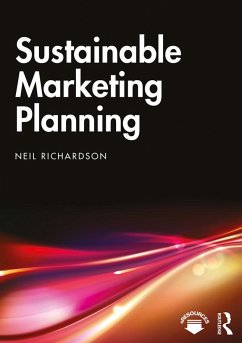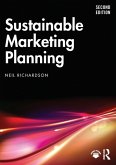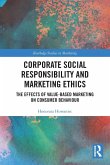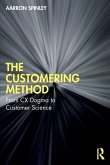Neil Richardson (UK Leeds Business School)
Sustainable Marketing Planning
Neil Richardson (UK Leeds Business School)
Sustainable Marketing Planning
- Broschiertes Buch
- Merkliste
- Auf die Merkliste
- Bewerten Bewerten
- Teilen
- Produkt teilen
- Produkterinnerung
- Produkterinnerung
There are two major parallel challenges facing managers and leaders: first, how to adapt to global changes in markets, competition and supply, and second, how to grow a business while observing recognisably sustainable practices.
Andere Kunden interessierten sich auch für
![Sustainable Marketing Planning Sustainable Marketing Planning]() Neil RichardsonSustainable Marketing Planning42,99 €
Neil RichardsonSustainable Marketing Planning42,99 €![Practical Digital Marketing and AI Psychology Practical Digital Marketing and AI Psychology]() J. Jonathan GabayPractical Digital Marketing and AI Psychology195,99 €
J. Jonathan GabayPractical Digital Marketing and AI Psychology195,99 €![Ethical Consumption Ethical Consumption]() Alex Hiller (UK Nottingham Trent University)Ethical Consumption70,99 €
Alex Hiller (UK Nottingham Trent University)Ethical Consumption70,99 €![Practical Digital Marketing and AI Psychology Practical Digital Marketing and AI Psychology]() J. Jonathan GabayPractical Digital Marketing and AI Psychology78,99 €
J. Jonathan GabayPractical Digital Marketing and AI Psychology78,99 €![Corporate Social Responsibility and Marketing Ethics Corporate Social Responsibility and Marketing Ethics]() Honorata HowaniecCorporate Social Responsibility and Marketing Ethics41,99 €
Honorata HowaniecCorporate Social Responsibility and Marketing Ethics41,99 €![Ethical Consumption Ethical Consumption]() Alex HillerEthical Consumption21,99 €
Alex HillerEthical Consumption21,99 €![The Customering Method The Customering Method]() Aarron SpinleyThe Customering Method45,99 €
Aarron SpinleyThe Customering Method45,99 €-
-
-
There are two major parallel challenges facing managers and leaders: first, how to adapt to global changes in markets, competition and supply, and second, how to grow a business while observing recognisably sustainable practices.
Hinweis: Dieser Artikel kann nur an eine deutsche Lieferadresse ausgeliefert werden.
Hinweis: Dieser Artikel kann nur an eine deutsche Lieferadresse ausgeliefert werden.
Produktdetails
- Produktdetails
- Verlag: Taylor & Francis Ltd
- Seitenzahl: 272
- Erscheinungstermin: 11. November 2019
- Englisch
- Abmessung: 246mm x 177mm x 22mm
- Gewicht: 506g
- ISBN-13: 9780367025212
- ISBN-10: 0367025213
- Artikelnr.: 58310313
- Herstellerkennzeichnung
- Libri GmbH
- Europaallee 1
- 36244 Bad Hersfeld
- gpsr@libri.de
- Verlag: Taylor & Francis Ltd
- Seitenzahl: 272
- Erscheinungstermin: 11. November 2019
- Englisch
- Abmessung: 246mm x 177mm x 22mm
- Gewicht: 506g
- ISBN-13: 9780367025212
- ISBN-10: 0367025213
- Artikelnr.: 58310313
- Herstellerkennzeichnung
- Libri GmbH
- Europaallee 1
- 36244 Bad Hersfeld
- gpsr@libri.de
Neil Richardson is the course director for postgraduate marketing programmes for Leeds Business School, UK. He has extensive experience as an academic and practitioner, including working with world-class companies in sales, marketing and customer services. He has published several books and academic articles on sustainable marketing.
Chapter 1: Why Sustainable Marketing? 1.1 Sustainable Marketing and its
influences 1.2 Sustainability... the new organisational orientation 1.3
Critical Marketing 1.4 Corporate versus customer-centric values 1.5 The
Sustainable Consumer and Buyer Behaviour 1.6 Sustainable Marketing Research
1.7 Systems and Customer-Centricity Chapter 2: The Marketing Mix 2.1
Communications (aka marcomms) 2.2 Convenience (aka Place) 2.3 Customer
benefits (aka Product) 2.4 Cost to customers (aka Price) 2.5 The
Sustainable Services Mix (featuring People, Process and Presence) Chapter
3: Sustainable Marketing Planning 3.1 Planning Frameworks 3.2 Situation
Review 3.3 External Environmental Frameworks and Analysis 3.4 Generating
Useful SM Objectives 3.5 Strategic SM Choices - Sustainable Segmentation,
Targeting and Positioning 3.6 Strategic SM Choices - Choosing a Strategy to
Achieve SM Objectives 3.7 Issues of Control and Measuring Value 3.8
Barriers to Adopting Sustainable Marketing Planning Chapter 4: Themes Today
and Tomorrow 4.1 Relationship Marketing 4.2 Internal Marketing 4.3
Sustainable Entrepreneurship 4.4 Sustainable Branding 4.5 Global
Sustainable Marketing 4.6 Digital Marketing in the Sustainable Age 4.7 SMEs
and Micro-Enterprises 4.8 Charities, Not-for-profit Marketing and Third
Sector Organisations
influences 1.2 Sustainability... the new organisational orientation 1.3
Critical Marketing 1.4 Corporate versus customer-centric values 1.5 The
Sustainable Consumer and Buyer Behaviour 1.6 Sustainable Marketing Research
1.7 Systems and Customer-Centricity Chapter 2: The Marketing Mix 2.1
Communications (aka marcomms) 2.2 Convenience (aka Place) 2.3 Customer
benefits (aka Product) 2.4 Cost to customers (aka Price) 2.5 The
Sustainable Services Mix (featuring People, Process and Presence) Chapter
3: Sustainable Marketing Planning 3.1 Planning Frameworks 3.2 Situation
Review 3.3 External Environmental Frameworks and Analysis 3.4 Generating
Useful SM Objectives 3.5 Strategic SM Choices - Sustainable Segmentation,
Targeting and Positioning 3.6 Strategic SM Choices - Choosing a Strategy to
Achieve SM Objectives 3.7 Issues of Control and Measuring Value 3.8
Barriers to Adopting Sustainable Marketing Planning Chapter 4: Themes Today
and Tomorrow 4.1 Relationship Marketing 4.2 Internal Marketing 4.3
Sustainable Entrepreneurship 4.4 Sustainable Branding 4.5 Global
Sustainable Marketing 4.6 Digital Marketing in the Sustainable Age 4.7 SMEs
and Micro-Enterprises 4.8 Charities, Not-for-profit Marketing and Third
Sector Organisations
Chapter 1: Why Sustainable Marketing? 1.1 Sustainable Marketing and its
influences 1.2 Sustainability... the new organisational orientation 1.3
Critical Marketing 1.4 Corporate versus customer-centric values 1.5 The
Sustainable Consumer and Buyer Behaviour 1.6 Sustainable Marketing Research
1.7 Systems and Customer-Centricity Chapter 2: The Marketing Mix 2.1
Communications (aka marcomms) 2.2 Convenience (aka Place) 2.3 Customer
benefits (aka Product) 2.4 Cost to customers (aka Price) 2.5 The
Sustainable Services Mix (featuring People, Process and Presence) Chapter
3: Sustainable Marketing Planning 3.1 Planning Frameworks 3.2 Situation
Review 3.3 External Environmental Frameworks and Analysis 3.4 Generating
Useful SM Objectives 3.5 Strategic SM Choices - Sustainable Segmentation,
Targeting and Positioning 3.6 Strategic SM Choices - Choosing a Strategy to
Achieve SM Objectives 3.7 Issues of Control and Measuring Value 3.8
Barriers to Adopting Sustainable Marketing Planning Chapter 4: Themes Today
and Tomorrow 4.1 Relationship Marketing 4.2 Internal Marketing 4.3
Sustainable Entrepreneurship 4.4 Sustainable Branding 4.5 Global
Sustainable Marketing 4.6 Digital Marketing in the Sustainable Age 4.7 SMEs
and Micro-Enterprises 4.8 Charities, Not-for-profit Marketing and Third
Sector Organisations
influences 1.2 Sustainability... the new organisational orientation 1.3
Critical Marketing 1.4 Corporate versus customer-centric values 1.5 The
Sustainable Consumer and Buyer Behaviour 1.6 Sustainable Marketing Research
1.7 Systems and Customer-Centricity Chapter 2: The Marketing Mix 2.1
Communications (aka marcomms) 2.2 Convenience (aka Place) 2.3 Customer
benefits (aka Product) 2.4 Cost to customers (aka Price) 2.5 The
Sustainable Services Mix (featuring People, Process and Presence) Chapter
3: Sustainable Marketing Planning 3.1 Planning Frameworks 3.2 Situation
Review 3.3 External Environmental Frameworks and Analysis 3.4 Generating
Useful SM Objectives 3.5 Strategic SM Choices - Sustainable Segmentation,
Targeting and Positioning 3.6 Strategic SM Choices - Choosing a Strategy to
Achieve SM Objectives 3.7 Issues of Control and Measuring Value 3.8
Barriers to Adopting Sustainable Marketing Planning Chapter 4: Themes Today
and Tomorrow 4.1 Relationship Marketing 4.2 Internal Marketing 4.3
Sustainable Entrepreneurship 4.4 Sustainable Branding 4.5 Global
Sustainable Marketing 4.6 Digital Marketing in the Sustainable Age 4.7 SMEs
and Micro-Enterprises 4.8 Charities, Not-for-profit Marketing and Third
Sector Organisations








